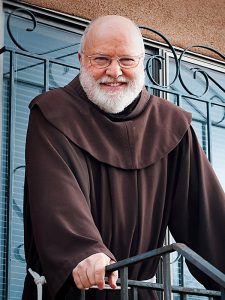
Human lives can be thought of as having two distinct halves.
When the halves of a person’s life are discussed, a major concern for someone like Fr. Richard Rohr, OFM, is how a person transitions from one half to the other.
“My case is that our culture certainly is not teaching people how to do that,” said Rohr, an author, Franciscan priest of the New Mexico Province and founder of the Center for Action and Contemplation in Albuquerque, New Mexico. “We have so many immature elders; they’re elderly, but not elders. And even sadder to me is that the churches — which should be the experts in this sort of thing — they aren’t doing it either.”
At 2 p.m. today, July 16, in the Hall of Philosophy, Rohr will give advice on how to make “The Transition,” as part of Week Four’s interfaith theme, “Falling Upward: A Week with Richard Rohr.”
Rohr’s interfaith lectures this week are based on his 2011 book, Falling Upward: A Spirituality of the Two Halves of Life.
Making the transition through life, according to Rohr, is part of letting go of what he calls a “first half of life culture.”
“It’s preoccupied with superficial things: self-image, power, money, war and entertainment,” he said. “We’re going to entertain ourselves to death, I think.”
Rohr said that cultural emphasis on the first half of life leaves people “unprepared” to deal with problems that can arise later in life.
“If you keep building your life on looking good and being rich, you’re going to be severely let down,” he said. “So you have a lot of mental health issues today, like suicides. People who don’t know how to live in this world, if they experience any failure, loss or rejection, they don’t know how to cope.”




